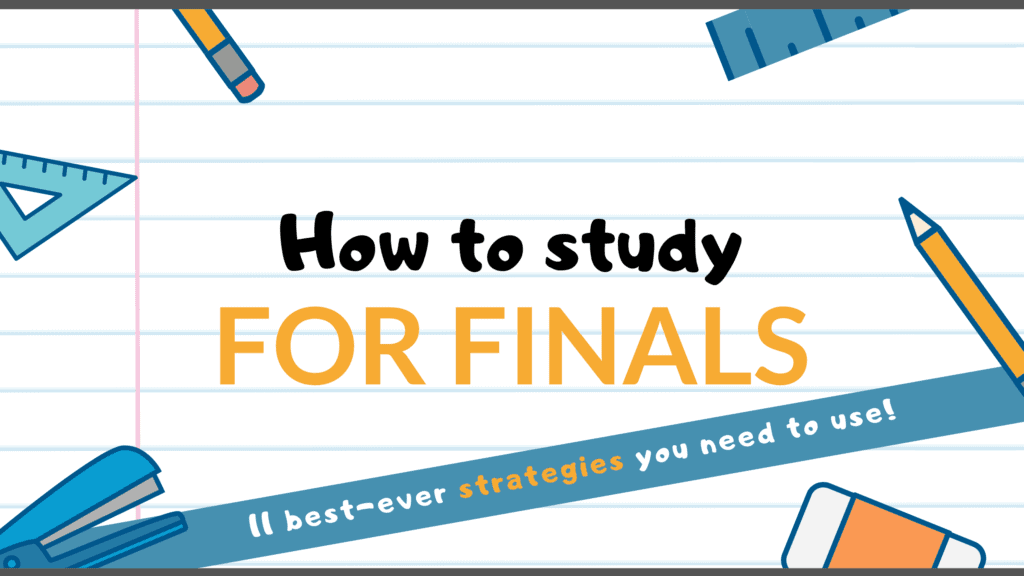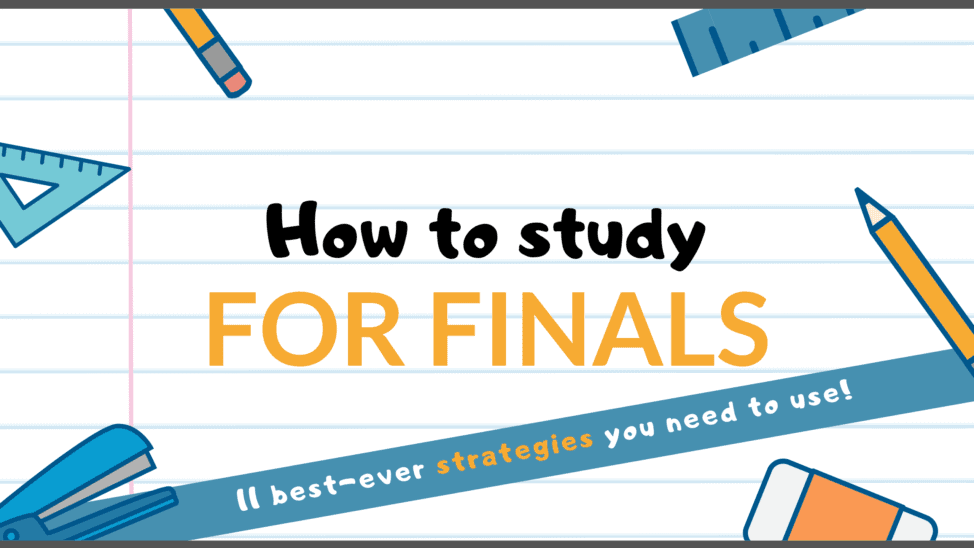
By Katie Azevedo, M.Ed.
In the 11 steps below, I break down how to study for final exams. But you could use the 11 strategies to study for your midterms as well. Basically, if you know how to study for final exams, you can use the same process to prepare for any cumulative test.
Many of the study tips below you have heard about in my videos or read about on my blog. But I’m repeating them here in a very particular order so that you don’t have to search through all my tutorials and try to figure out what to do when. Yo’ welcome.
How to study for final exams
1. Find out what’s on the test as early as possible. Ideally, find out what material will be on your final exam at least three weeks before the test. If your teacher hasn’t made that info available yet, ask him or her in advance.
2. Gather your materials. After you figure out what will be on your final, gather ALL the materials – both paper and digital – that contain the info you will need to study. Physically put these materials all in one place: that could mean printing out anything digital so that you have a paper copy to put with your other paper stuff. Collect and organize old quizzes, class notes, textbook pages (photocopy the textbook pages you need to study, so you don’t have to lug the textbook around), handouts, etc.
3. Create a study schedule. To do this, sit down with an actual calendar and map out what days and what times you will study, as well as what you will study on each day. Use your piles from Step 2 to help you plan your time. Be realistic: don’t write down that you’re going to study for 7 hours on a Saturday night. No you won’t, and neither is a that a good idea. Short and frequent study sessions are the best. (Here’s how and why.)
4. Once you gather your materials, organize them by topic. For example, if your final exam is on chapters 10-20, organize your materials by individual chapter. Once you group your materials into topics, you will see which topics you will need to spend more time reviewing (the big pile of papers) and which topics you can review in less time (the small pile of papers).
5. Make a study guide. I’ve gone over how to make a study guide before. For more detail and a picture, see Step 3 in this post here.
Basically, here are the steps for making a study guide:
- Make a BLANK study guide with vocab, concepts, names, etc. that you will need to know. Again, for more detail on this step and for a picture/template, check out Step 3 in this post here.
- Print out multiple copies of this blank study guide – at least 5 or 6 copies.
- Make one master copy answer key by using all your materials to FILL IN THE STUDY GUIDE. Use all your resources to this.
6. Practice filling in your study guide OVER AND OVER AGAIN. See how much you can fill in each time without looking up the answer. After each attempt to fill in the study guide, circle the questions / topics / vocabulary that you don’t know, and then go study that stuff. Repeat this step until you can fill in the entire study guide by yourself.
7. Vary up your study techniques. When you’re studying the material that you circled on your study guide (the questions you left blank because you didn’t know the answers), use different study techniques depending on a) your learning style, and b) the content. Search for “study tips” in the search bar on this page here and you’ll find a bazillion study hacks.
8. Make your study sessions interesting. Go someplace new to study, like a cafe, bookstore, or even the public library in a nearby town. Get fresh pens and notecards. Bring snacks. Do what you have to do to make your study sessions something to look forward to.
9. After you’ve studied alone, consider studying in a group. First of all, group-study sessions are not for everyone (personally, ick) – so it’s okay if you don’t want to take this step. Second, the key is to do this AFTER you study alone. Always study solo first, and then in groups.
10. Stop studying when you know your stuff. Here’s how to know when to stop studying. If you over-study, you can psych yourself out. If you are “done” studying more than two days before the final exam, review the material one last time the night before the test, just to refresh.
11. During the exam, use specific test-taking strategies and hacks. Sure, knowing how to study for final exams and actually preparing for the test are obviously important, but so is what you do WHILE you take the test. Here are some test-taking hacks.

